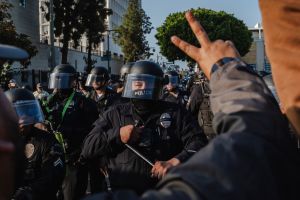Reverse Missions: Back to the Catacombs (Part 3)
The weary old building reeked with death. Spiritual demise had occurred long ago at the hands of theologies that strangled biblical truth. Members had aged, the young had moved on, and clergy who questioned the relevancy of their own lives and beliefs spoke to congregations of a dozen or less – themselves soon to die.
Europe is littered with the "catacombs" of dead religion. But in some of those grave stone buildings life is sweeping in again. Followers of Jesus are returning to the catacombs. The "reverse missionaries" from Africa and Asia, many of whom are the fruit of earlier European missions, are returning to lands that once colonized their own. They lease or buy deserted church facilities whose decaying walls throb with exuberant worship styles and passionate preaching.
In London, an edifice constructed in the Victorian era to house a once-booming Baptist church now sits in a neighborhood of tombstone-like 19th century buildings. Urban rot surrounds it. But a thriving congregation of African émigrés has taken over the old structure and infused it with passion the old timbers may never have known.
The immigrants bring a strand of Gospel proclaiming that Christ is alive, the Holy Spirit is active, and the Bible is the authority, not only for belief, but for every aspect of living.
On a recent trip to Paris to conduct a conference on global change for a network of African churches, my wife and I ran headlong into the transitions. One evening we were taken into a cavernous apartment block whose graffiti was a Rosetta Stone of cultures. Burka-clad women walked among Gauloises-smoking mustachioed Frenchmen, and dodged soccer balls kicked by tykes and teenagers trying to make a tight gray-walled courtyard into a playing field.
We rode a cramped elevator up four levels, and into the apartment of a beaming African man we'll call Emil. His strapping sons and vibrant daughters joined us for the meal prepared by his wife, who had poured in all the skills she had learned back home.
Emil and his family are like another we spent time with in Copenhagen. They send their children daily to public schools dictated to by a State that has cashed in absolute truth for utilitarian values. In Scandinavia especially, said the Copenhagen couple, children are taught they are supreme. The parents are to obey them. The little ones must question and challenge parental authority. It is their duty to do so, says the State.
The biblically formed family with a father as spiritual leader is a return to an old and brutal age, the children are taught, as is the "hate-filled" teaching on sexuality of the "puritanical" church of the past. The state church in Scandinavia has difficulty being a prophet to the rulers to whom it holds out its hands for salaries, mortgages, and capital improvements.
But not the "catacomb" Christians. In the rickety old buildings they have reclaimed and restored, they are free to teach their children the Bible's worldview. In the home groups scattered into those austere apartment blocks in Paris and the starkly minimalist flats of Scandinavia, parents and their offspring are discipled in the way of Christ, which often is radically different from the way of the State-sanctioned culture.
The spiritual diet in these house-based cells and catacomb-like church buildings is as rich and flavorful as the physical food served up from the African kitchens. Thomas Kore is among the teachers who help form the believers in Paris and other parts of Europe. Kore is a Hebrew scholar. He was encouraged by his pastor in West Africa to enlarge his skills as a linguist. Kore divides his time between Jerusalem, where he studies advanced biblical Hebrew, and France, where he instructs the "reverse missionaries" in rightly dividing the word of truth.
That truth collides with the official propaganda of the European State, which pumps its dogma into minds that have either lost or never had the reference point of absolutes. But the "reverse missionaries" with a generational perspective anchor their children in scriptural authority.
The "reverse missionaries" and other European Christians are returning to the catacombs, driven out of the public square by dominating States that find their message abhorrent and dangerous to their interests-just as the Roman State did 20 centuries ago. Rather than lamenting their catacombed existence, many of the Christ-followers in Europe have excitement and hope.
They know everywhere the church has been pushed underground into the catacombs it has flourished. The catacomb churches become catalytic communities that touch cultures with the worldview of God's Kingdom. Those in contemporary China have proven it, as have the underground churches of the Middle East and elsewhere.
The day will come when Europe – and perhaps the United States – will know it as well.



























